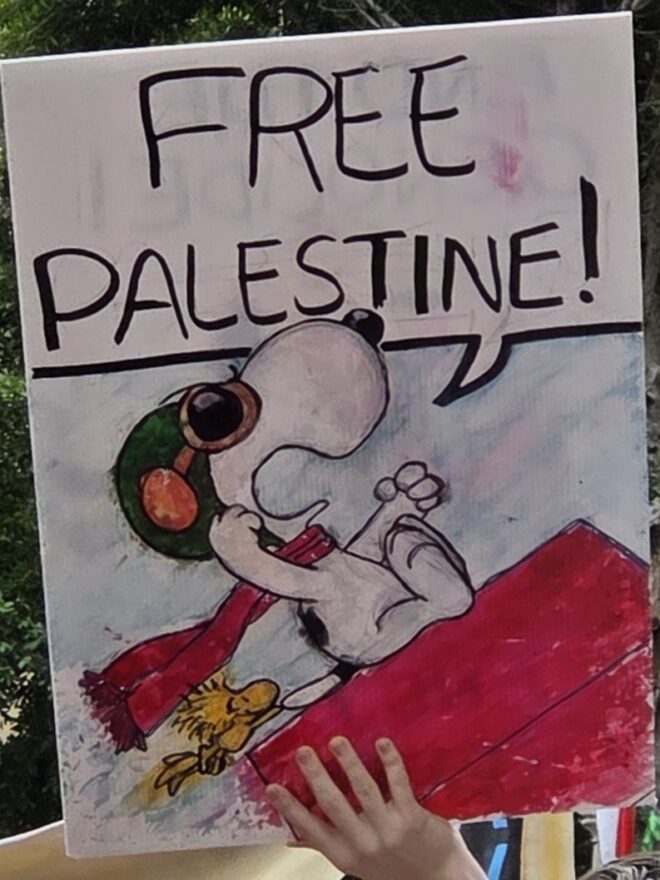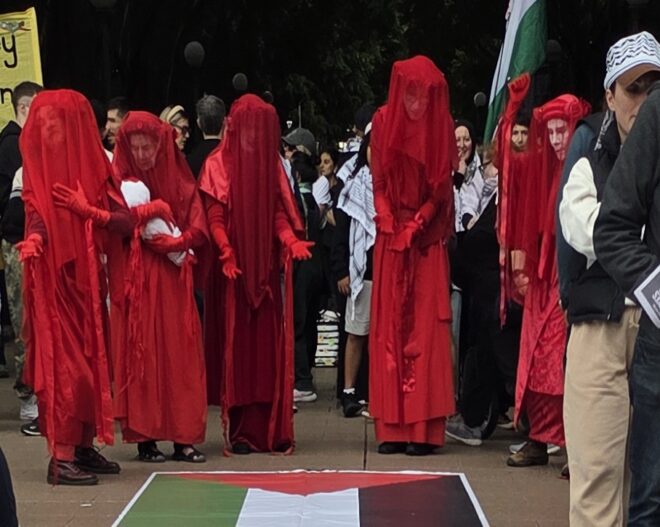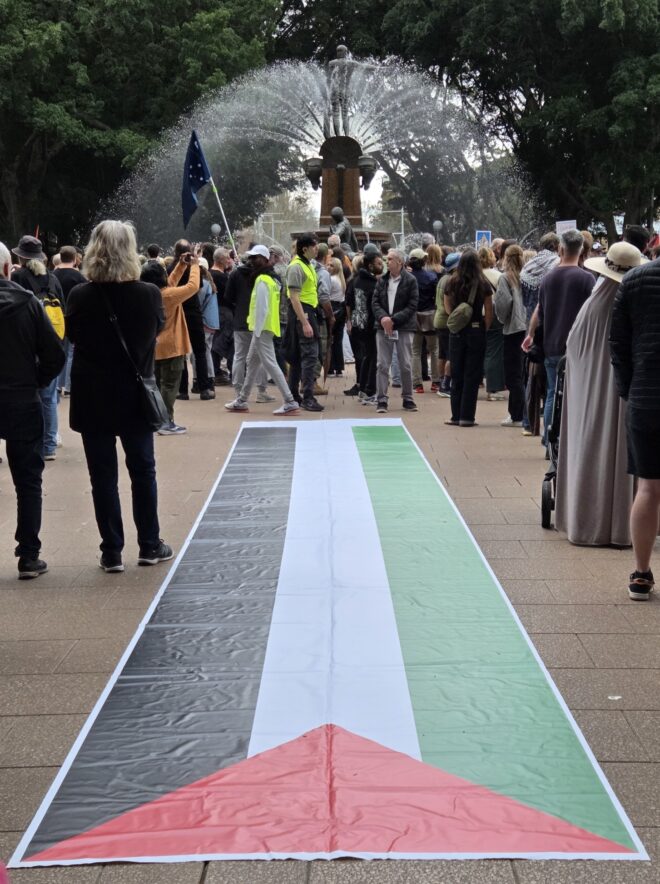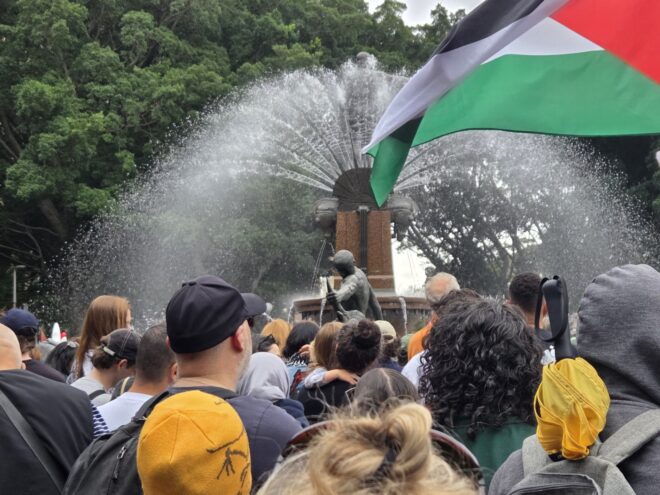
Beneath the stars, we share one flame,
Hearts beat steady, none to blame.
Skin may differ, paths may part,
Yet love unites each human heart.
by Bakchos.
On August 24, 2025, the streets of Sydney pulsed with the energy of thousands united in a powerful display of solidarity for Palestine. The Nationwide March for Palestine, organised by coalitions including the Palestine Action Group and Amnesty International Australia, saw Hyde Park transform into a sea of Palestinian flags, with chants of “Free Palestine” and “End the Genocide” reverberating through the city’s central business district. Protesters, carrying signs demanding sanctions on Israel and an end to Australia’s arms trade with the country, were driven by a collective outrage over the humanitarian crisis in Gaza. Reports of famine, deliberate aid restrictions, and escalating civilian casualties fuelled the march, reflecting a broader frustration with global inaction. The event drew a diverse crowd, Indigenous Australians, migrants, students, and elders, each connecting their own experiences of injustice to the Palestinian struggle. This was not just a protest but a clarion call for justice, echoing the sentiment that silence in the face of such suffering is complicity.
The Sydney march was part of a nationwide movement, with demonstrations occurring in over 40 Australian cities and towns, from Melbourne’s bustling streets to regional centres like Wollongong, Newcastle, and even remote Alice Springs. In Brisbane, Queen’s Gardens overflowed with marchers, while in Perth, thousands braved torrential rain to join the cause. Organisers estimated that Sydney and Melbourne each saw around 100,000 participants, with Brisbane drawing between 50,000 and 70,000. Nationwide, the total attendance was pegged at 300,000 to 350,000, marking these as the largest pro-Palestine demonstrations in Australia’s history. These figures, however, starkly contrasted with police estimates, which claimed crowds as low as 10,000 in key cities like Sydney and Melbourne. This discrepancy raises critical questions about intent and accuracy, underscoring a broader battle over narrative control.
The motivations behind the march were clear: a response to the dire situation in Gaza, where famine had been officially declared, and reports detailed deliberate starvation tactics, widespread destruction, and the deaths of tens of thousands, including children, journalists, and aid workers. Protesters called for immediate action—sanctions on Israel, a halt to arms exports, and recognition of Palestinian suffering under what many described as a genocidal campaign. The involvement of over 250 community organisations, including unions, environmental groups, and political figures, highlighted a growing consensus that Australia’s foreign policy must prioritise humanitarian principles over geopolitical alliances. Indigenous speakers drew parallels between their own history of dispossession and the Palestinian experience, emphasising land theft and systemic marginalisation. This intersectionality strengthened the movement, framing Palestine as a universal cause for justice.
Beyond Australia, the march was part of a synchronised global uprising. On August 24, 2025, protests erupted in at least a dozen countries, reflecting the universal resonance of the Palestinian cause. In Malaysia, Kuala Lumpur hosted rallies calling for boycotts and sanctions. In Kenya, Nairobi’s streets saw activists linking Gaza’s plight to African struggles against imperialism. Denmark’s Copenhagen drew over 10,000 marchers, while in the United States, demonstrations spanned small towns like Durango, Colorado, to coastal cities such as Monterey and Long Beach, California, and major hubs like Chicago, where demands focused on ending US military support for Israel. Scandinavian countries also saw solidarity events, with activists emphasising international law’s role in protecting vulnerable populations. Social media amplified these actions, with hashtags like #FreePalestine and #SanctionIsrael trending globally, connecting disparate communities in a shared narrative of resistance. This global coordination was no accident; it reflected a growing awareness that the Palestinian struggle is a litmus test for humanity’s commitment to justice.
The scale of participation in Australia, particularly in Sydney, Melbourne, and Brisbane, was staggering. Organisers’ estimates of 100,000 in both Sydney and Melbourne, and 50,000 to 70,000 in Brisbane, painted a picture of a nation mobilised. These numbers underscored the movement’s momentum, with families, youth, and elders marching side by side, their diversity a testament to the cause’s broad appeal. Yet, the police’s claim of 10,000 attendees in key cities was a stark underestimation, a tactic not uncommon in protest reporting but one that demands scrutiny.
Who benefits from underreporting these numbers? Downplaying attendance serves multiple interests, primarily those invested in maintaining the status quo. Governments, wary of public pressure that could force policy shifts like sanctions or arms embargoes, may encourage law enforcement to provide conservative figures, portraying the movement as fringe rather than mainstream. This minimises the protests’ legitimacy, allowing officials to dismiss them as the work of a vocal minority. Media outlets, influenced by editorial biases or ownership ties sympathetic to pro-Israel narratives, often amplify these lower estimates, framing the events as disorganised or extremist. Such portrayals discourage broader participation and shift focus from the core issues of human suffering. Pro-Israel lobbying groups, with significant influence in Western politics, benefit most; smaller reported crowds reduce the urgency for accountability, preserving Israel’s image as a beleaguered democracy rather than a state engaged in controversial actions. These distortions serve entities that prioritise economic and military ties over ethical considerations. Accurate reporting of the massive turnouts—100,000 in Sydney alone—would instead amplify calls for change, forcing a reckoning with complicity in the crisis.
The heart of the March for Palestine lies in the urgent need for world solidarity, a force capable of transcending borders to confront atrocities. In Gaza, the systematic targeting of an unarmed civilian population by one of the world’s most powerful militaries has been labelled by many as genocide. Reports of deliberate aid blockades, leading to famine, and the deaths of tens of thousands, including vulnerable groups, underscore the scale of the crisis. Solidarity is not just a moral stance but a pragmatic necessity, uniting humanity against violations that threaten global stability. Without it, powerful states can act with impunity, eroding the post-World War II framework of human rights designed to prevent such horrors.
Solidarity’s power is evident in historical movements. The anti-apartheid campaign against South Africa in the 20th century began with local resistance in Soweto but grew into a global force. Boycotts, cultural sanctions, and UN resolutions pressured the regime, with countries like Sweden and India leading diplomatic efforts. Grassroots activists in the US and UK pushed for divestments, contributing to Nelson Mandela’s release and democratic elections. The Vietnam War protests of the 1960s and 1970s saw worldwide demonstrations, from Paris to Tokyo, amplifying anti-war sentiments and influencing US policy. More recently, the global response to Myanmar’s 2017 Rohingya genocide led to International Court of Justice investigations, showing how solidarity can mobilise legal avenues. These examples illustrate that collective action—through protests, economic pressure, and diplomacy—can shift power dynamics, even against formidable states.
For Palestine, solidarity counters an asymmetry of power. Israel’s advanced military, backed by Western alliances, faces a population with limited defences. Global unity amplifies Gaza’s voices, spreading awareness of bombings, displacement, and starvation. It pressures governments for arms embargoes, humanitarian corridors, and sanctions. In Sydney, diverse crowds, Indigenous, Muslim, Jewish, Christian, marched together, embodying this unity. Solidarity also sustains activists, preventing burnout by sharing the burden across nations. In a globalised world, where conflicts disrupt supply chains, fuel migration, and escalate tensions, solidarity safeguards collective interests.
Yet, solidarity must be paired with accountability, the cornerstone of international justice. Holding every country accountable for crimes against its population or neighbours is non-negotiable, regardless of geopolitical clout. Israel must face scrutiny for actions in Gaza, including allegations of war crimes like targeting civilians and restricting aid. But this principle applies universally: Russia’s invasion of Ukraine prompted International Criminal Court warrants for President Vladimir Putin over child deportations and infrastructure attacks. China’s treatment of Uyghurs in Xinjiang, involving mass detentions and forced labour, has drawn sanctions, though broader action is needed. Myanmar’s junta faces ICC referrals for the Rohingya genocide, with leaders indicted. Sudan’s Omar al-Bashir was charged for Darfur atrocities, leading to his ouster. Historical precedents like the Nuremberg Trials, which prosecuted Nazi leaders, and the International Criminal Tribunal for the former Yugoslavia, which convicted Slobodan Miloševi?, show accountability’s feasibility through tribunals, sanctions, and universal jurisdiction, where countries like Spain try foreign perpetrators.
Accountability faces obstacles: UN Security Council vetoes, often by the US on Gaza resolutions, block progress. Non-ICC members like Israel, Russia, and the US evade direct jurisdiction, necessitating reforms. Civil society, through movements like Boycott, Divestment, Sanctions (BDS), plays a critical role, mirroring anti-apartheid tactics. For Palestine, accountability means pursuing ICC investigations into settlements and bombings, while ensuring Hamas faces scrutiny for its actions. Universal accountability deters violations, provides justice, and reinforces global norms.
The influence of Zionism on Western governments complicates this pursuit, often presenting a biased view of Israel. Through lobbies like AIPAC in the US and similar groups in Australia and Europe, Zionist advocacy shapes policy, emphasising Israel’s technological and democratic achievements while downplaying occupation, settlements, and human rights abuses. This manifests in media narratives prioritising Israeli security, legislative measures suppressing BDS, and continued arms sales despite evidence of misuse. Such bias perpetuates the conflict, alienating publics informed by independent sources like social media or firsthand accounts.
As someone whose family were caught up in the Holocaust, I approach this issue with deep sympathy for Israel’s right to exist within its internationally recognised borders. The Holocaust’s horrors, six million Jews systematically murdered, underscore the necessity of a secure Jewish homeland to prevent antisemitism’s resurgence. This historical trauma demands acknowledgment, yet it cannot overshadow the Palestinians’ equal rights to life, dignity, and self-determination. Since the 1948 Nakba, Palestinians have faced displacement, occupation, and now famine, deserving the same protections. Balancing these competing rights is the world’s challenge, requiring diplomacy, mutual recognition, and an end to violence.
A balanced approach could revive Oslo Accords principles, addressing root causes like settlements and blockades. Education—teaching both Holocaust and Nakba histories—fosters empathy. Economic initiatives, like joint development projects, build trust. Accountability is key: Israel for Gaza violations, Palestinians for governance issues, ensuring neither side’s rights infringe on the other’s.
Solidarity extends to environmental and economic dimensions. Gaza’s blockade has devastated agriculture and water, exacerbating famine. Global efforts could include aid convoys, reconstruction funds, and climate resilience programs, recognising conflicts’ environmental toll. Economically, boycotts target complicit corporations, redirecting resources to humanitarian needs.
Technology and media are vital but complex. Social media spreads awareness but risks misinformation; responsible use amplifies verified Gaza stories. Cultural exchanges, Palestinian poetry, Israeli peace songs, humanise the conflict, fostering connection.
Strengthening institutions is critical for accountability. Reforming the UN to limit vetoes, expanding ICC jurisdiction, and supporting NGOs like Human Rights Watch are steps forward. Universal jurisdiction laws enable prosecutions anywhere, deterring leaders.
Historical solidarity movements offer lessons. The abolition of slavery involved transatlantic coalitions, from British parliamentarians to American abolitionists. Women’s suffrage gained through international conferences. These show persistence’s power.
For Palestine, solidarity means sustained pressure: weekly vigils, petitions, electoral advocacy. It counters isolation, reminding Palestinians they are not alone. Grassroots efforts, like Australia’s union endorsements, amplify impact. Solidarity also educates, challenging biased narratives and fostering informed publics.
The Palestinian cause intersects with other struggles. Indigenous Australians at the Sydney march linked their dispossession to Palestine’s, highlighting universal themes of land and identity. Climate activists noted Gaza’s environmental crisis, reinforcing solidarity’s multidimensional nature.
Accountability requires nuance. While Israel faces criticism, Hamas’s actions, like rocket attacks, must be addressed. A balanced approach ensures no side is absolved, fostering trust in justice processes. International mediators, like Norway or Qatar, could facilitate dialogue, building on past successes.
The global response to Gaza reflects a shifting consciousness. Young people, galvanised by social media, drive protests, rejecting traditional narratives. This generational shift, evident in Sydney’s youth-heavy crowds, signals a future where solidarity and accountability are non-negotiable.
In conclusion, the March for Palestine in Sydney on August 24, 2025, was a beacon of hope amid despair. Driven by outrage over Gaza’s suffering, amplified by global participation, and marked by debates over scale, it underscores the imperative for solidarity and accountability. By uniting against genocide and holding all nations responsible, Israel included, we honour human dignity. This balanced approach, sympathetic to Israel’s existence while championing Palestinian rights, paves the way for peace. Let us commit to this path, for in solidarity and justice lies our shared humanity.





